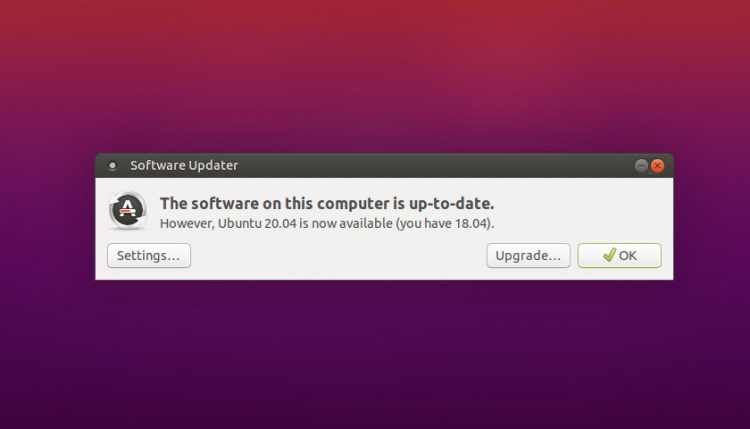Well folks, it’s here; the first Ubuntu 20.04 LTS point release is now available for download.
Ubuntu 20.04.1 LTS rolls together all the bug fixes, app updates, performance tweaks, and security patches that have been rolled out to the “Focal Fossa” since its release back in April.
The result is a brand new installer image primed for use, and able to cut down the number of post-install updates required.
This point release combines all the bug fixes, app updates, and security patches issued to 20.04 so far
But there’s another reason why the arrival of a point release is pretty big news.
Freshly spun ISO aside it is from today that users who run Ubuntu 18.04 LTS ‘Bionic Beaver’ will see a notification asking if they want to upgrade to Ubuntu 20.04.
Prior to now anyone on Ubuntu 18.04 LTS who wanted to upgrade to Ubuntu 20.04 LTS had to do so manually (either by opting in to non-LTS releases in the Software & Updates tool or by running a terminal command, which we covered in a tutorial).
That effort is no longer necessary; it’s possible to upgrade from 18.04 LTS to 20.04 LTS directly.
Ubuntu 20.04’s First Point Release

Point releases rarely bring major new features with them but they do bring a barrel full of convenience. Merging together all of the thousands of updates, patches and tweaks released since April into a neat, new and easily deployable image is a major time saver.
You get:
- Installer fixes
- Upgrade fixes
- Snap app update fixes
- Performance tweaks
- New fingerprint login flow
- OEM kernel support
- Wireguard support
Refer to the full changes summary for (a rather dizzying amount of) detail on these changes and more. Also take note of the Ubuntu security notices up to July 24.
Upgrade Ubuntu 18.04 to 20.04

As mentioned, the arrival of this point release offers the opportunity to upgrade from Ubuntu 18.04 LTS to 20.04 LTS directly. Don’t Miss Ubuntu 20.04 Feature Guide for 18.04 Upgraders
If you intend to take advantage of this option then please remember to backup of any important files before you begin and make sure your network connection is stable — you don’t want to be left with a half-upgraded system!
Once back up you can look forward to the raft of major features and changes offered by the “Focal Fossa”, including:
- Brand new look and feel
- FIle favouriting in Nautilus
- External drives in Ubuntu Dock
- CSD in the Terminal app
- New login and lock screen
- Fractional scaling support
- App folders in apps grid
- Flicker free boot
- Better performance
- Updated apps
And that’s just a mere tickle on the surface of what’s changed.
In a rush? Get yourself up to speed on what’s new in Ubuntu 20.04 LTS by watching our release video, embedded at the start of this post (if you’re reading from an RSS reader or a scraper site you can click this link to watch it).
Why is there a delay?
Ubuntu LTS releases are the most widely used versions of Ubuntu. Tens of millions of users all around the world use them to enjoy a solid, stable, and reliable computing experience.
The three-month period between an LTS release (April) and the first point release (July) gives Ubuntu devs more time to iron-out wrinkles and fix any lately-discovered bugs.
All of this helps ensure upgrades are as smooth and are as stable as possible — a key concern for those who choose to use a LTS release in the first place.
Do I need to upgrade if I’m already running Ubuntu 20.04 LTS?
No, you do not need to “upgrade” to “get” this release because, technically, you already have it!Provided you install any updates as and when released you are up to date.
There are no major differences between the version you’re running and the version just released (though those who install using the new ISO may see a 20.0.4.1 version number shown in the System Settings > Details panel).
Is there a new kernel version?
Ubuntu point releases often include a new Hardware Enablement stack (HWE).
The HWE combines an updated graphics stack (handy if you’re a gamer) with a more recent Linux kernel version. This allows the OS stay to compatible with newer hardware and technologies for the duration of its five-year lifecycle.
However, the first point release (i.e. this one) does not include HWE. Ubuntu 20.04.1 ships with the same Linux kernel and xserver as the initial release back in April, meaning Linux 5.4.
Ubuntu 20.04.2 is due early next year. This will bring a new hardware enablement stack with it, derived from Ubuntu 20.10 (meaning Linux 5.8 or newer).
Download Ubuntu 20.04.1 LTS
You can download the Ubuntu 20.04.1 ISO images from the Ubuntu release server page using the following link:


Je moet ingelogd zijn om een reactie te plaatsen.